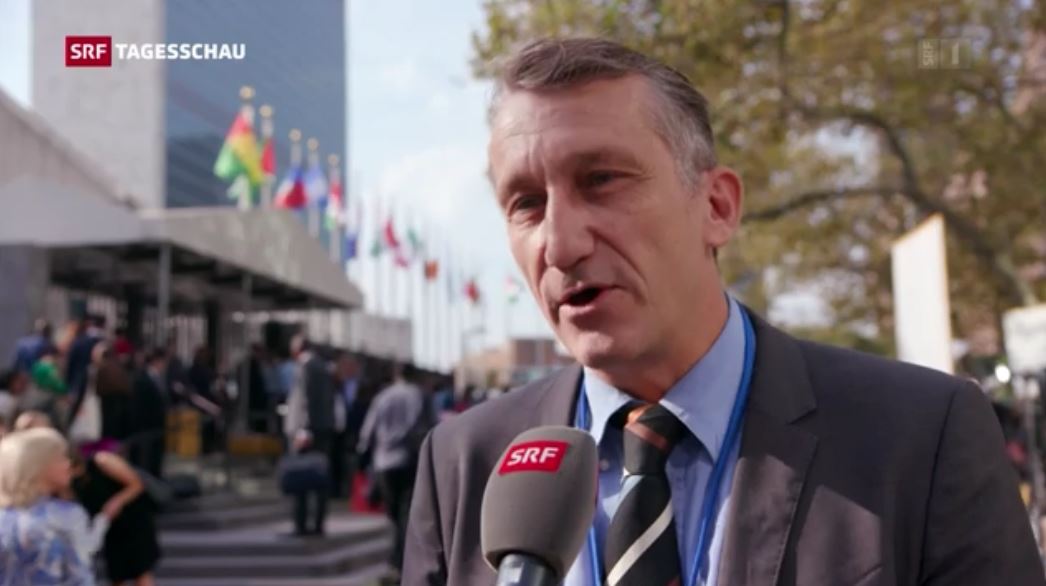Report Warns of Gap Between Current Trajectory and Achievement of SDGs
Leading up to the United Nations High-level Political Forum on Sustainable Development (HLPF), an independent group of scientists issued the Global Sustainable Development Report 2019 (GSDR) on September 11. “The Future is Now: Science for Achieving Sustainable Development,” is an assessment of the progress towards the SDGs, highlighting the gap between the current development model and what needs to be done to meet the goals. Out of the 169 sub-targets for the 17 higher-level SDGs, many are off track and some are even regressing, such as those related to tackling climate change, inequalities, and biodiversity loss. The scientists argue that an optimistic future is still possible, but only through concerted mass action changing policies, incentives, and actions.
Peter Messerli (Co-chair of the GSDR 2019, Co-Chair of Future Earth’s Global Land Programme, and Director of the Centre for Development and Environment at the University of Bern) presented to the UN General Assembly on September 24 as part of the SDG Summit 2019. He was one of the scientists in the opening session of the forum, speaking on the first GSDR report, The Future is Now: Science for Achieving Sustainable Development.

The report emphasizes that achieving the SDGs requires decoupling economic growth from environmental degradation, while simultaneously reducing social and gender inequalities in wealth, income, and access to opportunities. To change humanity’s trajectory, the scientists point to a few key areas to transform, including food, energy, consumption and production, and cities. Transformations in these sectors must occur through coordinated action by governments, business, communities, civil society, and individuals.
The GSDR 2019 focuses on a knowledge-based transformation to sustainable development and stresses the crucial role that science has to play. It proposes a framework that emphasizes the following three key areas of knowledge production:
- Understanding systemic interactions: how human-environment system dynamics can produce trade-offs that prevent progress in individual targets, or produce synergies
- Understanding competing development agendas: how values and interests of powerful actors help or hinder the 2030 Agenda for Sustainable Development, and how rules and incentives can enable collaboration toward common goals
- Understanding transformations in concrete contexts: combining different sets of transformation pathways based on the needs and conditions of each setting
In a related commentary in Nature Sustainability, Messerli and others argue for a universally accessible and mutually beneficial sustainability science to underpin meeting the SDGs. The scientists point to the role of the International Science Council (ISC) in supervising the collaborative expansion of the proposed six system entry points that the GSDR claims are needed to rebalance the relationship between people and nature. (These six research areas can be read in the comment “Expansion of sustainability science needed for the SDGs”).
Messerli and others say that researchers should focus on rapidly collecting and assessing existing information on successful or failed interventions towards realising the 2030 Agenda. In order to bridge this knowledge gap, they call for institutions and structures such as sustainable development open-access knowledge platforms created by governments in collaboration with research institutions. Secondly, they also call for novel tools and approaches such as experimental labs that bring together diverse actors to innovate and test new practices with researchers. Thirdly, they claim that robust global networks must be established between national and regional knowledge platforms, to understand the six systemic entry points’ relationship to each other. They recommend connecting to a network such as Future Earth to explore transboundary interactions and spill over effects. In order to fund this massive undertaking of sustainability science, Messerli and others call for a swift mobilization of funding by at least a tenfold increase. Research funding should be realigned to a joint overarching mission for sustainability science and realisation of the SDGs. Funding should come not only from traditional science funders but also from international agencies, multi-lateral development banks, national governments, the private sector, and philanthropic donors.
The GSDR Report claims that science must play a major role in advancing sustainable development. Using the 2030 Agenda as a guide, universities, policymakers and research funders should increase support to research following those lines. The report also makes the case for understanding the interconnections between individual SDGs and the systems in society to create policies that can manage difficult trade-offs.
DATE
October 8, 2019AUTHOR
Yuki HashimotoSHARE WITH YOUR NETWORK
RELATED POSTS
Future Earth Members Selected as Experts for IPCC Special Report on Cities
Sign the COP28 statement. The Science is Clear: We Need Net Zero Carbon Dioxide Emissions by 2050.
Unmasking our Carbon and Climate Futures